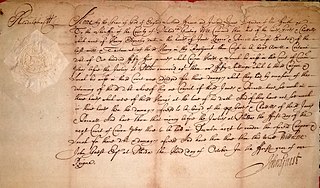Related Research Articles

An associate justice of the Supreme Court of the United States is any member of the Supreme Court of the United States other than the chief justice of the United States. The number of associate justices is eight, as set by the Judiciary Act of 1869.
Oxford University Press (OUP) is the university press of the University of Oxford. It is the largest university press in the world, and its printing history dates back to the 1480s. Having been officially granted the legal right to print books by decree in 1586, it is the second oldest university press after Cambridge University Press.

A jurist is a person with expert knowledge of law; someone who analyses and comments on law. This person is usually a specialist legal scholar, mostly with a formal qualification in law and often a legal practitioner. In the United Kingdom the term "jurist" is mostly used for legal academics, while in the United States the term may also be applied to a judge. With reference to Roman law, a "jurist" is a jurisconsult (iurisconsultus).

In common law, a writ is a formal written order issued by a body with administrative or judicial jurisdiction; in modern usage, this body is generally a court. Warrants, prerogative writs, subpoenas, and Certiorari are common types of writ, but many forms exist and have existed.
In law, a judgment, also spelled judgement, is a decision of a court regarding the rights and liabilities of parties in a legal action or proceeding. Judgments also generally provide the court's explanation of why it has chosen to make a particular court order.

The Patriarch of Alexandria is the archbishop of Alexandria, Egypt. Historically, this office has included the designation "pope".
A civil list is a list of individuals to whom money is paid by the government, typically for service to the state or as honorary pensions. It is a term especially associated with the United Kingdom and its former colonies of Canada, India, New Zealand, Singapore and many more. It was originally defined as expenses supporting the monarch.

The Keeper or Master of the Rolls and Records of the Chancery of England, known as the Master of the Rolls, is the President of the Civil Division of the Court of Appeal of England and Wales and Head of Civil Justice. As a judge, the Master of the Rolls is second in seniority in England and Wales only to the Lord Chief Justice. The position dates from at least 1286, although it is believed that the office probably existed earlier than that.

The Right Honourable the Lord Lyon King of Arms, the head of Lyon Court, is the most junior of the Great Officers of State in Scotland and is the Scottish official with responsibility for regulating heraldry in that country, issuing new grants of arms, and serving as the judge of the Court of the Lord Lyon, the oldest heraldic court in the world that is still in daily operation.
In forma pauperis is a Latin legal term meaning "in the character or manner of a pauper". It refers to the ability of an indigent person to proceed in court without payment of the usual fees associated with a lawsuit or appeal.

A consul held the highest elected political office of the Roman Republic, and ancient Romans considered the consulship the second-highest level of the cursus honorum after that of the censor. Each year, the Centuriate Assembly elected two consuls to serve jointly for a one-year term. The consuls alternated in holding fasces – taking turns leading – each month when both were in Rome and a consul's imperium extended over Rome and all its provinces.
The Latin adverb sic inserted after a quoted word or passage indicates that the quoted matter has been transcribed or translated exactly as found in the source text, complete with any erroneous, archaic, or otherwise nonstandard spelling, punctuation, or grammar. It also applies to any surprising assertion, faulty reasoning, or other matter that might be interpreted as an error of transcription.

Oxford High School is an independent day school for girls in Oxford, England. It was founded by the Girls' Day School Trust in 1875, making it the city's oldest girls' school.

Peter of Aigueblanche was a medieval Bishop of Hereford. A nobleman from Savoy, he came to England as part of the party accompanying King Henry III's bride Eleanor of Provence. He entered the royal service, becoming bishop in 1241. He then served the king for a number of years as a diplomat, helping to arrange the marriage of Prince Edward. Peter became embroiled in King Henry's attempts to acquire the kingdom of Sicily, and Peter's efforts to raise money towards that goal brought condemnation from the clergy and barons of England. When the barons began to revolt against King Henry in the late 1250s and early 1260s, Peter was attacked and his lands and property pillaged. He was arrested briefly in 1263 by the barons, before being mostly restored to his lands after the Battle of Evesham.
Bramwell is a surname derived from an unidentified hamlet in England, the name of which comes from the Old English for 'broom' or 'bramble well'. The location of the place it referred to is difficult to trace, as the surname is distributed fairly evenly throughout England. In modern times, 'Bramwell' has also been used as a masculine given name, with the short form 'Bram'. A variant form of this name is 'Branwell' and another possible meaning is "raven's well".
Giles de Braose was Bishop of Hereford from 1200 to 1215.

Sir Job Charlton, 1st Baronet KS was an English judge and politician who sat in the House of Commons between 1659 and 1679. He was Speaker of the House of Commons of England briefly in 1673.

Sir John Mellor was an English judge and Member of Parliament.
Swami in Hinduism is an honorific title given to a male or female ascetic who has chosen the path of renunciation (sannyāsa), or has been initiated into a religious monastic order of Vaishnavas. It is used either before or after the subject's name.
References
 This article incorporates text from a publication now in the public domain : Chambers, Ephraim, ed. (1728). Cyclopædia, or an Universal Dictionary of Arts and Sciences (1st ed.). James and John Knapton, et al.
This article incorporates text from a publication now in the public domain : Chambers, Ephraim, ed. (1728). Cyclopædia, or an Universal Dictionary of Arts and Sciences (1st ed.). James and John Knapton, et al.{{cite encyclopedia}}: Missing or empty|title=(help)- "dedimus" . Oxford English Dictionary (Online ed.). Oxford University Press. (Subscription or participating institution membership required.)